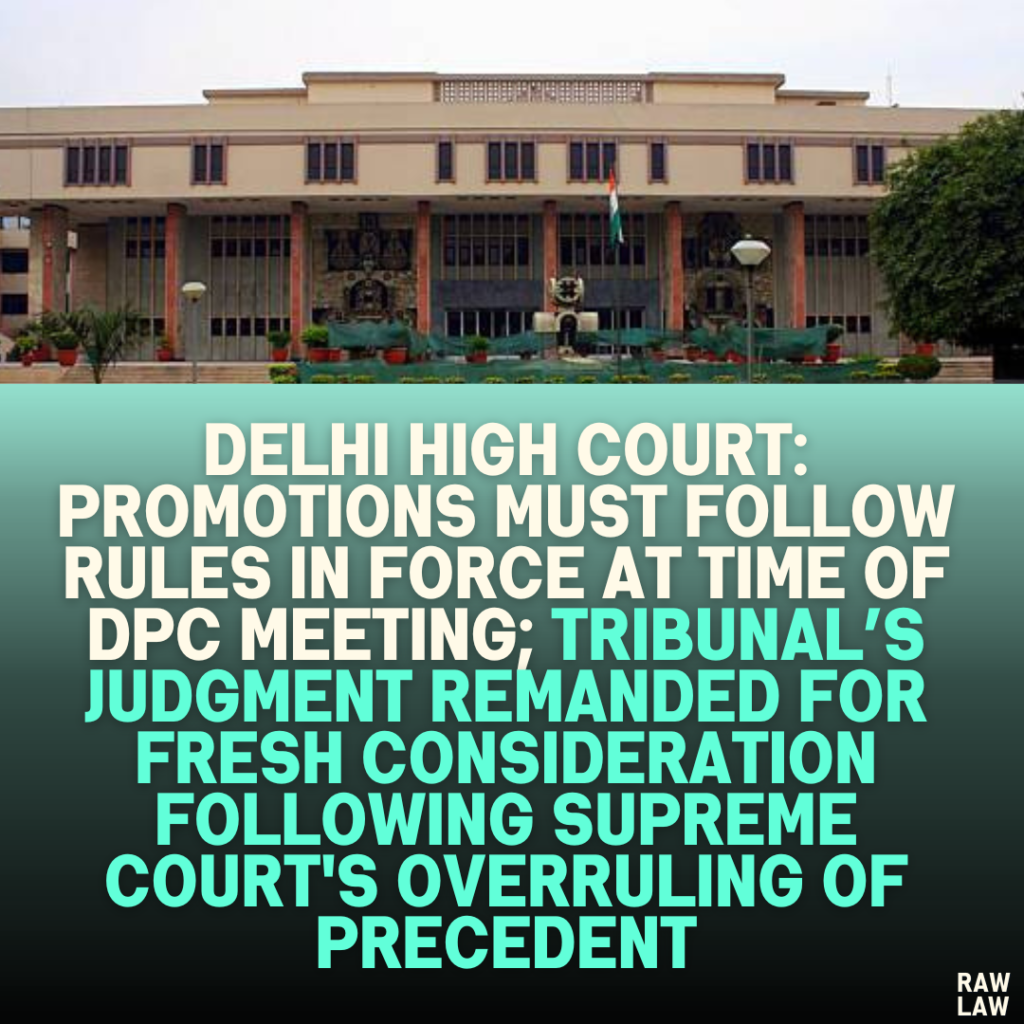Court’s Decision:
The Delhi High Court set aside the Central Administrative Tribunal’s (CAT) judgment dated March 16, 2007, which had upheld the application of outdated service rules (1990 Rules) for promotions. The High Court ruled that the CAT’s judgment was based on an outdated precedent from Y.V. Rangaiah v J. Sreenivasa Rao (1983), which had since been overruled by the Supreme Court in State of Himachal Pradesh v Raj Kumar (2023). Consequently, the High Court remanded the matter back to the Tribunal for fresh consideration, directing it to decide the case in light of the updated legal framework established by the Raj Kumar ruling.
The High Court did not express any opinion on the merits of the case and directed that the matter be resolved promptly, requesting the Tribunal to issue a final ruling within four weeks of the next hearing.
Facts:
- Background of the Dispute:
- The case revolved around promotions to the position of Principal Private Secretary in the Armed Forces Headquarters.
- The vacancies for the promotions arose during 2003–2004.
- The Departmental Promotion Committee (DPC) met on October 12, 2004, after the Armed Forces Headquarters Stenographers’ (Group A and Group B posts) Service Rules, 2004 (“2004 Rules”) had come into force.
- Contention of the Applicants:
- The applicants argued that the 2004 Rules should govern the promotions since the DPC met after the implementation of these rules.
- They contended that applying the older Armed Forces Headquarters Stenographers’ Service (Private Secretary Grade) Rules, 1990 (“1990 Rules”) was erroneous and disadvantageous to them.
- Decision of the Central Administrative Tribunal:
- The Tribunal upheld the DPC’s decision to apply the 1990 Rules.
- It relied on the precedent set by the Supreme Court in Y.V. Rangaiah, which held that rules in effect at the time the vacancies arose govern promotions.
Issues:
- Was the application of the 1990 Rules by the DPC legally valid, considering that the 2004 Rules were in force when the DPC met?
- Should the precedent set in Y.V. Rangaiah v J. Sreenivasa Rao still be applied, given that it was overruled by the Supreme Court in State of Himachal Pradesh v Raj Kumar?
Petitioner’s Arguments:
- The petitioners argued that the DPC erred by relying on the outdated 1990 Rules.
- They emphasized that the promotions should have been governed by the 2004 Rules since these were the operative rules at the time the DPC convened in October 2004.
Respondent’s Arguments:
- The respondents contended that the vacancies arose in 2003–2004 when the 1990 Rules were in effect, and hence these rules should govern the promotions.
- They relied on the principle established in Y.V. Rangaiah (1983), which held that the rules effective at the time of vacancy determine the eligibility and process for promotions.
Analysis of the Law:
- Supreme Court’s Precedent in Y.V. Rangaiah v J. Sreenivasa Rao (1983):
- This judgment held that the service rules effective at the time the vacancies arose must govern the process of promotions.
- The principle became a benchmark for cases involving retrospective application of rules.
- Exception Introduced in K. Ramulu v Suryaprakash Das (1997):
- This case allowed deviation from the Rangaiah principle in situations where the DPC’s delay was intentional and aimed at awaiting new rules or amendments.
- Overruling of Rangaiah in State of Himachal Pradesh v Raj Kumar (2023):
- The Supreme Court explicitly overruled Rangaiah, holding that the rules in force at the time of the DPC meeting should govern the process unless specific legislative provisions state otherwise.
- This marked a significant shift in the jurisprudence surrounding the applicability of service rules to promotions.
Precedent Analysis:
- Y.V. Rangaiah v J. Sreenivasa Rao (1983): Rules at the time of vacancy govern promotions.
- K. Ramulu v Suryaprakash Das (1997): Allowed deviations under specific circumstances.
- State of Himachal Pradesh v Raj Kumar (2023): Established that the rules in force at the time of the DPC meeting govern promotions, effectively overruling Rangaiah.
Court’s Reasoning:
- The Delhi High Court acknowledged that the CAT’s judgment was based on Rangaiah, which was the binding precedent at the time.
- However, given that Rangaiah was overruled by the Supreme Court in Raj Kumar, the High Court found it necessary to remand the matter to the CAT for reconsideration under the updated legal framework.
- The court clarified that it was not expressing any opinion on the merits of the case and left all issues of fact and law open for adjudication by the CAT.
Conclusion:
The High Court:
- Set aside the CAT’s judgment.
- Remanded the case to the CAT for fresh consideration in light of the Raj Kumar judgment.
- Directed the CAT to resolve the matter expeditiously, urging the parties to file written submissions before the next hearing.
Implications:
- Precedential Shift:
- The case underscores the impact of the Supreme Court’s decision to overrule Rangaiah. Tribunals and lower courts must now adhere to the principle that rules in force at the time of the DPC meeting govern the promotion process.
- Administrative Guidance:
- The decision highlights the importance of ensuring that promotion decisions align with the latest legal precedents to avoid prolonged litigation.
- Judicial Efficiency:
- The High Court’s directive for expedited resolution demonstrates its commitment to minimizing delays in cases of significant administrative importance.
